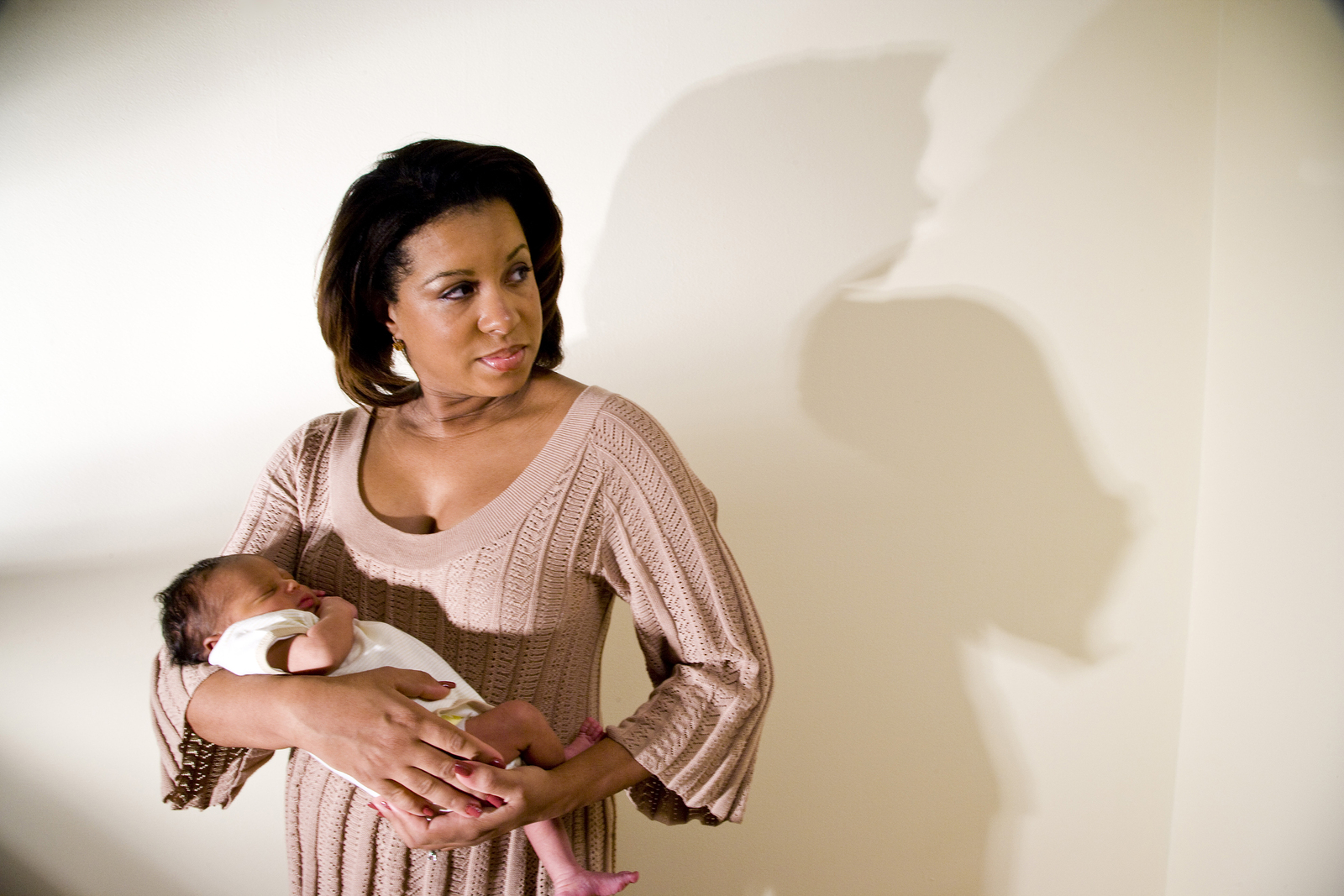Postpartum depression’s silver lining
The media – magazines, movies, television and the internet – often like to portray pregnancy and childbirth as an amazing picture-perfect experience. But women who have been through it often experience this time much differently.
One of the most common instances of this difference is when a new mother experiences postpartum depression (PPD). This can be especially brutal if she sailed through her pregnancy, even enjoying the experience, and then has symptoms of PPD. But I believe that a story of a good prenatal experience that is followed by a bad case of postpartum depression points to a specific health issue that might otherwise go unnoticed – a hormonal imbalance that can resurface or persist all the way through your life especially into menopause.
It’s never too late to recognize PPD
Whether you are way past your childbearing years or just recently had a baby, it’s important for you to pay attention to your postpartum emotions. If you are a new mom who is feeling mildly depressed, or if you felt that way when your now-teenage son or daughter was still in diapers, please understand that there are physical issues related to these emotions. Even years later, these symptoms are important to recognize.
I have patients tell me all the time, “I haven’t felt quite right ever since I gave birth,” long after her child has grown out of infancy. This makes complete sense: if there was an imbalance in your body before you had a baby that manifested as PPD symptoms, then it’s highly likely that it’s still with you even after PPD resolves.
And here’s the good news – that’s the silver lining to PPD. Having PPD symptoms can highlight a hormonal imbalance problem that you can do something about before it starts causing you major difficulties with your menopausal transition. This is especially important to recognize if you’re an older mom who might already be starting perimenopause. When you try to balance your hormones while you are chasing a toddler around, it can be a challenge, to say the least! The two simply do not seem to go together. So let’s discuss what happens to your hormones after you have a baby and how PPD can act as a signpost for regaining your hormonal balance afterward.
It’s not just a “mood” you’re in—your hormones after pregnancy
As I so often tell my patients, your endocrine system is inextricably linked with your brain and nervous system. It is like an orchestra, that needs to have everything in balance or the overall effect is off. This explains why women are more prone to problems with mood during their hormonal fluctuations. These periods of vulnerability include puberty (menarche), premenstruation, pregnancy, childbirth, and menopause.
Having a baby is near the top of the list of hormonal transitions, when it comes to how “big” its impact is in our lives! Mother Nature gives many amazing ways to maintain our wellness through change, however historically; childbirth has been the biggest risk to survival that a woman may face.
The hormonal tides of adolescence, perimenopause, and menopause usually appear in our lives in a more gradual way, but the hormones in childbirth act like a tsunami, flooding us all at once. In the modern world, a mother’s survival through childbirth is not usually a big concern. However, the risk of depression and other mood problems does rise during these unique times in a woman’s life, especially when she is under stress of any kind (and have you ever heard of a new mom who wasn’t?).
The hormonal transition post pregnancy is quite drastic; in one single moment, you go from being pregnant to not pregnant. Postpartum emotions can make you feel as if something is really wrong, but these feelings are normal and natural in that they reflect the hormonal changes that are happening in your body and brain. But that doesn’t mean the feelings are optimal for keeping you and your child healthy. Most likely, the message they are sending is, “Send more support!” And that can mean emotional support, help with caring for the baby, and most importantly, support for your physical healing.
If your symptoms of PPD are long gone, you might be saying, “NOW you tell me!” — but hear me out, because it’s still not too late to benefit from your PPD experience.
What PPD tells us about our hormones
One of the most significant hormones related to PPD is progesterone. During pregnancy, the levels of progesterone in a woman’s body are at their highest. Progesterone helps to prevent lactation (secretion of milk from your breasts) during pregnancy, and then a sudden drop in its level takes place just before birth. This allows labor to begin and lactation to start. Isn’t it amazing what our bodies can do?
However, a few women will have symptoms of depression that include severe irritability, poor sleep, and agitation, and restless behavior (you may have heard of women who go to clean the basement when feeling out of sorts, but the symptoms are sometimes more severe and disruptive).
Alternatively, progesterone has a calming effect on your brain. If you’re one of the women affected this way, your mood can change following childbirth, as it returns to your pre-pregnant levels around day five after delivery. For you, and women like you, a deficiency of progesterone is an important characteristic of PPD.
Understanding your own sensitivity level
What’s complicated about progesterone is that it’s not always deficiency that’s the issue. Some women are extremely sensitive to fluctuations in progesterone levels. That means that even if the hormone is at what is considered a “normal” level, these women’s bodies and brains respond as if they’re experiencing abnormally low progesterone. For them the balance of the hormones, the orchestra, is out of tune. This means we cannot simply perform a test to determine if the progesterone level is low—we also must find out if a woman has a history that points to this kind of sensitivity.
How can you find out if you’re one of the women who is highly sensitive to fluctuations in progesterone levels? As I encourage all women to gain more knowledge about their bodies, I suggest that you understand your personal reproductive rhythms. In your menstrual cycle, progesterone is at its highest after ovulation, and then it drops just before menstruation. There are mood changes that you might feel that are associated with this drop in progesterone. These changes are similar to those seen in PPD—it’s almost as if PPD is a magnified form of your PMS moods.
If you have major mood changes before, during, or after your menstrual cycle, it could indicate that you are highly sensitive to the changes in your progesterone levels. This means that you’re more likely to develop PPD. And if any of the above makes you immediately think “This is me!” it’s very likely that you could have a hormonal imbalance when you reach menopause.
When motherhood and menopause converge
Women are waiting much longer to become first-time mothers; it’s not uncommon for a woman to be 35 or older. Many practitioners consider this “advanced maternal age” and sometimes see it as a challenge to know what that means for maternal health during and after pregnancy. I think this concern might be blown out of proportion. There are advantages for women who choose to delay their families until their 30s or 40s, one of which is a lower incidence of PPD.
A healthy 40-year-old woman actually has less risk than some younger mothers for PPD, because she probably has a stable family life and a social support system, in addition to a stronger sense of self. Mothers in their late 30s and 40s have probably spent more time planning for motherhood, and they may be better prepared for the challenges of caring for a newborn. They are also much more self aware and able to sustain many challenges with more grace than when they were younger. Studies show that women who are over 35 will more likely seek help for their symptoms of depression.
There is a larger concern about hormonal balance for mothers in their 40s (compared to younger moms). It’s not unusual for a later-life mom to go into menopause right after childbirth without any interlude. If you’re a new mom nearing (or in) perimenopause, it’s very important that you do your best to take care of your overall health to try to avoid PPD, in addition to decreasing your menopause symptoms while caring for your young children (particularly if you’re breastfeeding). Remember perimenopausal changes can occur 10 years prior to official menopause.
So let’s review some options that you can do right now, whether you want to address PPD or if you want to restore hormonal balance long after childbirth:
-
Think nutrition, nutrition, nutrition.
Food is the most powerful drug we have. If you’re a new mom and are breastfeeding, you should definitely continue taking the prenatal vitamins that you were (I hope) taking when pregnant. Consider adding a high-grade omega-3 fatty acid supplement, which studies show can act as a natural antidepressant, if it is not already in your prenatal nutrients.
If you’re not breastfeeding, or if you’re long past childbirth, then it’s still important to get your key vitamins and minerals. The old days of being able to get all of the necessary nutrients just from our food are long gone. I can’t stress enough how important a pharmaceutical-grade multivitamin is as a first step—but understand it is not the only step to good nutrition. Food sends messages to your body’s biochemistry, which in turn help to restore your body’s balance. The suggestions we offer in our article on eating to support your adrenal glands are just as effective in helping to heal your hormonal imbalances uncovered by PPD.
-
Include movement in your routine.
Most of us need some sense of routine in our life to feel “normal.” If you’re a new mom and you’re feeling not quite right, remember to create a new routine for yourself that is flexible enough to work with your baby’s changing schedule. Just the regimen of getting up each morning, bathing, and getting dressed will help you feel better, but the more you can do to move your body, the better you’ll feel.
Start with a gentle, simple exercise that can help you build and tone your muscles slowly, something such as yoga, t’ai chi, or taking your newborn for a walk. These are relatively easy to include in your schedule, even with a new baby. Do what you can to get outside and enjoy the sunshine and fresh air every day! That’s free and relatively easy for everyone.
Even if PPD is in your past, you might find it helpful to make changes to your existing routine to improve your hormonal balance. For example, if you don’t already have an exercise routine, make an effort to move your body daily. It doesn’t have to be an ambitious, hour-long, high-impact aerobics class! Just go for a walk, get out in the garden, stretch your body, or think of some other activity will give your health a boost.
Exercise promotes mood-stabilizing hormones and relieves stress—which are both important components to regaining hormonal balance. Most gyms now have babysitting services; when checking out options, don’t forget to ask!
-
Prioritize your health.
Busy moms sometimes forget to take time for themselves, as their focus is on the new baby. You might not realize that when you neglect your health, you and your whole family suffer. One of the best things you can do – for your own benefit as well as that of your children and family – is to take care of yourself. You will find you have more to give when you are filling up your needs first.
If you’ve been feeling physically out of sorts since childbirth—even if years have passed—talk to your healthcare practitioner about what’s been going on. There may be simple things that need to be adjusted. Look at our articles on adrenal health and fatigue to see if you see a pattern in your life, and take steps to correct these problems. Above all, don’t feel badly about taking care of yourself! It takes stamina and energy to run the show the way many mothers do.
- Explore your emotional story.
We have previously discussed the link between stress and health in our articles on emotions, health, and stress. Where PPD is concerned, some of what happened to you as a child might be enhancing your emotions about being a parent.
Ask yourself some questions. Were your parents loving and present in your life, or were they detached and absent, or even abusive? Do you feel confident about your capabilities as a mother, or are you frightened, confused, and unsure if you’ll be able to properly care for your child?
Sometimes we try to overcompensate for what we saw as lacking in our own childhood, and there are no parenting classes in high school or college. It’s easy to feel conflicted (or terrified). These factors can affect your physical well-being more than you might imagine, and if they’re part of your circumstances, consider talking with a therapist or using emotional healing techniques to address them.
Even if your child is grown, it’s still wise to look at your feelings about being a parent, if this is a source of stress for you. For some people, exploring these feelings can transform how they parent.
- You many want to consider bioidentical progesterone therapy.
When I see women with PPD at the clinic I often check their progesterone level. If it is unusually low, I recommend bioidentical progesterone therapy. Though there are no controlled studies to date of progesterone in the prevention or treatment of postpartum depression, I have used prescription-strength bioidentical progesterone replacement to help women whose levels remain very low postpartum, with fantastic results.
I sometimes use this practice in women whose depression presents with restlessness, sleeplessness, or agitation, even if their progesterone levels are normal. As previously discussed, these are the women who seem to be unusually sensitive to hormonal fluctuations. If I see a cyclic nature to the symptoms, I am especially likely to recommend this.
Natural progesterone has a known effect on the GABA receptors in the brain—the same receptors that opiate drugs (narcotics) bind to. I will say that this protocol is somewhat controversial, so many conventional practitioners may be unwilling to try it. But I (and many like minded colleagues) regularly see dramatic improvement in these women’s depression and anxiety, and although there have been no large trials to date that prove its efficacy, I have used this protocol with great effect many times for many years.
The progesterone protocol I use for PPD is 400 mg of bioidentical progesterone in divided doses: 100 mg in the a.m., 100 mg at noon; and 200 mg in the p.m. This regime is used from mid-cycle until menses resumes. I recommend that a reliable compounding pharmacies, such as Northern New England Compounding Pharmacy, or locally, Apothecary by Design or Women’s International Pharmacy, make this up for my patients as sublingual troches or capsules.
I am not as likely to use creams, as getting the appropriate dosage in cream form would require excessive amounts of cream three times per day. I divide the dose to prevent associated fatigue or “spacey” feelings that may sometimes be associated with a rapid increase in progesterone levels.
- Reduce inflammation.
Inflammation is one of the key factors in depression, and studies show that mothers with PPD have higher levels of inflammation. Other physical and psychosocial stressors (stress is one key factor) also increase inflammation.
Anxiety in first-time mothers is strongly linked with activation of the inflammatory response. Anything you can do to decrease anxiety and inflammation in your body is a good first step toward treating or avoiding PPD naturally. And even if you’re long past the likelihood of PPD, reducing anxiety is really good for your health
Another great approach to reducing inflammation is to avoid foods known to cause it, such as refined sugar or flour, caffeine, and alcohol. At the same time, you can increase your intake of nature’s best anxiety-dissolvers and anti-inflammatories, such as omega-3 fatty acids and safe, gentle herbs (good for moms and babies) such as turmeric, boswellia and motherwort.
Exercise, cognitive therapy, and the herbal antidepressant St. John’s Wort have also been revealed to help decrease inflammation. You have many choices, but for best results, consult with a professional, particularly if you’re breastfeeding. There are some herbs that are not particularly good for infants, and these should be avoided until you want to wean your baby. See also our articles on natural anti-inflammatories.
If you’re a new mom, these additional points apply to you
-
Seek help now if you’re currently have PPD or the baby blues.
The help that you get can transform the experience of being a mother. My earlier advice to prioritize your health is doubly important if you’re actually suffering from PPD right now. This is the hard part about PPD – understanding that it’s a physical problem that may need medical intervention.
There seems to be a stigma associated with any sort of mental illness that new moms might have – you may not want to let on that anything is wrong. It’s our tendency as women to hide our symptoms, continue to try to do everything, and pretend that we have everything under control even when we don’t. Whether your symptoms are mild and disappear in the first few weeks, or if you realize that there is something deeper going on, don’t think that taking care of yourself comes second to baby. The best thing you can do for your baby is to realize how essential is is to take care of yourself, and make sure you are whole and healthy.
If you’re feeling exhausted, overwhelmed, and teary, don’t wait to seek help. Talk to your healthcare practitioner about ways to reduce your burden, and then you can start the process to heal. If for any reason, you have thoughts about harming yourself or your baby, get help immediately! Your practitioner will understand that these thoughts are a sign of postpartum depression and you can start on a treatment plan that will help. Intervention needs to happen immediately. Most importantly, you should not feel embarrassed or ashamed about it – an imbalance in your hormones doesn’t make you a bad mother! And the best news is you can do something about it.
- Breastfeed to reduce maternal stress.
I recommend breastfeeding for two important reasons. It’s been proven that it’s better for the baby (except in unusual situations) as it provides essential nutrients; but just as importantly, it’s also good for you!. Breastfeeding can protect your mental and emotional health, because it lowers stress hormones such as cortisol, ACTH, epinephrine, and norepinephrine. Women who nurse also have a higher level of oxytocin, the wonderful “cuddle” hormone that is also excreted with love making.
Breastfeeding may promote faster weight loss, which could improve your mood as you adjust to your body’s changed appearance after the birth of your baby. It also encourages you to stay well-rested and hydrated—you can’t nurse your baby effectively if you’re always on the go, nor will your milk supply hold up if you don’t drink enough water.
On the flip side, if you’re having challenges with breastfeeding your baby you can become frustrated and stressed about it. Remember that you don’t have to figure out the problem alone. Most hospitals and birthing centers have lactation consultants who will assist you in learning how to breastfeed effectively, and many will come to your house if need be.
Contrary to popular belief, breastfeeding is not something that comes naturally to every mother. Most new mothers need to learn the best ways to offer this important nutrition to their child. In addition, you can contact the La Leche League for support.
Please understand that if breastfeeding is not an option, if it becomes a source of extreme stress for you, or if you’re too depressed, it is acceptable to give your baby formula. Don’t feel that you need to always put what’s best for your baby ahead of your own needs. Sometimes doing what you need to do to improve your health and emotional welfare is far more important to the baby’s well-being than any benefit that might come from breastfeeding. Babies are very sensitive to their mother’s energy, so a change that helps you will also have a helpful impact on the baby.
-
Don’t try to go it alone any longer.
Reaching out to your family, friends, and healthcare practitioner for additional support works wonders. Guilt is a characteristic that often pops up in women with PPD, that might not be present in other forms of depression. The first thing I tell new mothers concerned about postpartum depression is that it is an “amplification” of all our feelings—joy or sadness, sheer bliss or emotional upheaval—and it is very common – in big or small ways – after giving birth. It is also perfectly normal and natural.
I also remind the new mom that they need a tremendous amount of support and there is nothing wrong with that! Remember we are not taught to be mothers. Historically, a woman’s family was around to provide support and information was passed down through each generation. This is no longer the case.
This is also the time when a baby support group—though it may have seemed a little silly before baby arrived—can really save your day. Reach out and ask someone—your neighbor, your friend, your family to be there to help you. Most people want to help, but don’t want to intrude. If you make the first step, they will respond!
Putting the Pieces Together
I often have an “Aha!” moment when a woman comes to me with what look like perimenopausal symptoms and she tells me she experienced PPD after childbirth. Those dark days after giving birth, whether just recently or long ago, can become a beacon that will show you the way to changes that can transform your health. Even if you’re reading this information long after you had PPD, and you might have never even known that’s what it was, it’s okay. At Women to Women Healthcare Center, we know firsthand that it’s never “too late” to restore your body’s balance and make a change. It is really the first step that counts.







